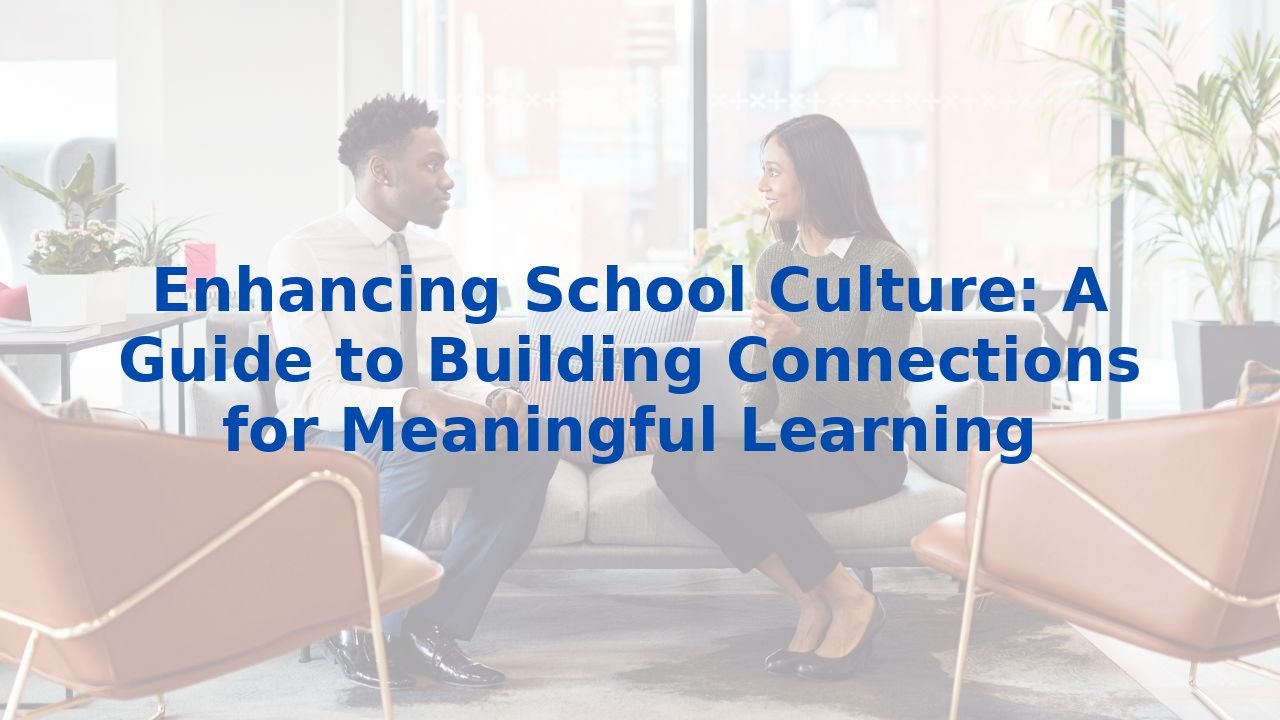Enhancing School Culture: A Guide to Building Connections for Meaningful Learning
Enhancing School Culture: A Guide to Building Connections for Meaningful Learning
In the ever-evolving landscape of education, the significance of school culture cannot be overstated. A robust culture not only fosters academic excellence but instills a sense of belonging and connection among students, educators, and the community at large. To transform school culture, it's vital to understand how generative AI can play a pivotal role in enhancing connections that lead to meaningful learning.
Understanding the Role of Generative AI in Education
Generative AI encompasses a range of artificial intelligence technologies designed to generate new content from existing data. In an educational context, this can include personalized learning experiences, lesson creation, and real-time feedback through various mediums such as text, audio, and visual aids. Imagine deploying AI tools that can help create tailored resources for individual learning needs, adapting dynamically to students' pace and understanding.
Connecting Stakeholders through Enhanced Communication
Effective communication is the cornerstone of a thriving school culture. Generative AI can revolutionize communication pathways by automating routine messages, facilitating cross-department collaboration, and ensuring information flows seamlessly throughout the organization. For instance, AI-driven platforms can help teachers send personalized updates to parents, fostering engagement and collaboration with families.
"By embracing AI tools, educational institutions can enhance their outreach efforts and nurture stronger, trust-based relationships with stakeholders."
Automating Administrative Tasks for Increased Efficiency
Administrative burdens can often weigh down educators, detracting from the core mission of teaching and learning. Generative AI can alleviate this stress by automating repetitive tasks like data entry, grading assessments, and managing schedules. This not only leads to a more organized school environment but also allows educators to dedicate more time to fostering connections with their students.
Enhancing Teacher-Student Interactions
Generative AI provides teachers with insights from historical data to tailor their approaches to student learning. By examining trends and behavior patterns, AI can help educators identify areas of struggle, allowing for timely interventions. Furthermore, AI systems can offer real-time feedback during instructional time, reaching students in a way that resonates with their unique learning styles and needs.
Promoting Collaborative Learning Experiences
Cultivating a school culture that emphasizes collaboration can benefit immensely from generative AI. These tools can facilitate group projects, suggest resources for research assignments, and even mediate discussions among students. By encouraging connections, AI can foster a cooperative learning environment where students feel valued and empowered to contribute.
The Importance of Training to Maximize AI Benefits
While the integration of generative AI presents a multitude of advantages, it's crucial to invest in proper training for educators and staff. Equipping the workforce with AI competency not only empowers teachers to maximize the technology's capabilities but also enhances their confidence in navigating new tools.
- Upskilling Educators: Training programs should focus on how to use AI effectively in lesson planning and classroom management. This will enable educators to embrace the innovation rather than shy away from it.
- Fostering Creativity: With time saved through automation, educators can devote their energy to creativity and student engagement, driving a more dynamic learning environment.
Navigating Ethical Considerations
As schools implement generative AI, ethical considerations must remain at the forefront. Transparency in AI usage is essential to reassure students, parents, and faculty of the integrity of the educational environment. It's paramount to encourage a culture of critical thinking, where students learn to assess the reliability of AI-generated content.
A Vision for the Future of Educational Culture
In the quest to enhance school culture, the embrace of generative AI represents a promising avenue. By connecting stakeholders more effectively, automating administrative tasks, and enriching teacher-student interactions, we can pave the way towards a more collaborative and inclusive educational atmosphere. As we move forward, let’s advocate for training and ethical considerations to ensure the successful integration of AI technologies in fostering meaningful learning experiences. Together, we can unlock the potential within our schools, turning them into vibrant hubs of connection and growth.



